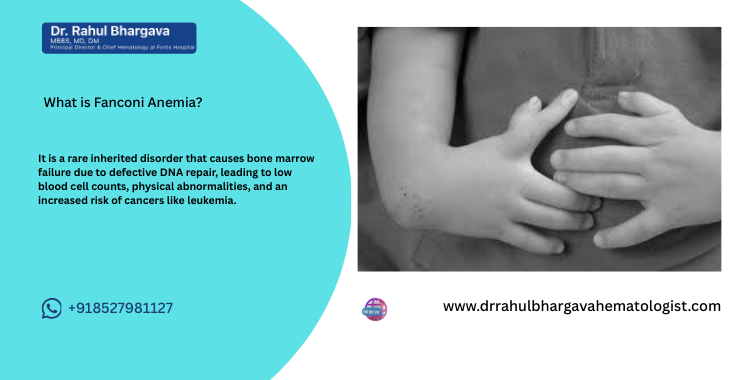Fanconi Anemia (FA) In India

Fanconi Anemia (FA) is a rare, inherited blood disorder that results in bone marrow failure and increases the risk of cancers, especially leukemia. It is caused by genetic mutations affecting the body's ability to repair damaged DNA. FA symptoms can include physical abnormalities, low blood counts, and developmental delays. Diagnosis involves blood tests, chromosome breakage tests, and genetic analysis. Treatment options in India include bone marrow transplant, growth factors, and supportive care. With advanced care offered by experts like Dr. Rahul Bhargava, India provides effective and affordable treatment, making it a trusted destination for Fanconi Anemia management.
About Fanconi Anemia:
Fanconi anemia (FA) is a rare, inherited blood disorder that leads to bone marrow failure. It affects the body’s ability to produce blood cells, which are vital for oxygen transport, immune response, and clotting. Over time, FA can lead to various health complications, including a higher risk of certain cancers and physical abnormalities. Dr. Rahul Bhargava, a leading hematologist in India, specializes in diagnosing and treating this complex condition, offering personalized care for each patient.
Types of Fanconi Anemia:
Fanconi anemia is classified based on the specific genetic mutations involved. There are currently more than 20 identified genes associated with FA, each contributing to different types of the disorder:
FANCA, FANCC, FANCG: These are the most common types, accounting for approximately 90% of all cases.
Rare Types (FANCD1, FANCE, FANCF, etc.): These less common types are associated with different genetic mutations, often leading to more severe symptoms and complications.
Somatic Mosaicism: In some cases, individuals may have cells with both normal and mutated genes, resulting in a milder form of the disease.
Causes of Fanconi Anemia:
Fanconi anemia is primarily caused by inherited mutations in specific genes responsible for DNA repair. These mutations disrupt the ability of cells to repair damaged DNA, leading to the accumulation of genetic defects that can cause bone marrow failure and increase the risk of cancer. FA is inherited in an autosomal recessive manner, meaning both parents must carry the defective gene to pass it on to their child.
Symptoms of Fanconi Anemia:
The symptoms of Fanconi anemia can vary widely from person to person, but they generally include:
- Physical Abnormalities: These may include skeletal anomalies such as short stature, missing or misshapen thumbs, and developmental delays.
- Blood Disorders: Patients often develop aplastic anemia, characterized by a shortage of all types of blood cells (pancytopenia). This can lead to fatigue, frequent infections, and easy bruising or bleeding.
- Increased Cancer Risk: FA patients are at a higher risk of developing cancers, particularly leukemia, and squamous cell carcinoma.
- Endocrine Problems: Growth hormone deficiency, thyroid dysfunction, and other endocrine issues are also common in FA patients.
Diagnosis of Fanconi Anemia:
Diagnosing Fanconi anemia involves a combination of clinical evaluations, laboratory tests, and genetic analysis:
- Blood Tests: These tests check for low blood cell counts and other abnormalities.
- Chromosome Breakage Test: This is a key diagnostic tool for FA. It measures how well cells repair damaged DNA.
- Genetic Testing: Identifying mutations in the FA-associated genes confirms the diagnosis and helps determine the specific type of FA.
Treatment of Fanconi Anemia:
The treatment for Fanconi anemia is tailored to the individual’s symptoms and may include:
- Bone Marrow Transplant (BMT): This is currently the most effective treatment for FA. It involves replacing the faulty bone marrow with healthy marrow from a compatible donor.
- Androgens and Hematopoietic Growth Factors: These medications can help stimulate blood cell production and delay the need for a transplant.
- Supportive Care: Regular monitoring, blood transfusions, and treatment for infections are critical aspects of managing FA.
- Cancer Surveillance: Given the increased cancer risk, patients require regular screenings and early interventions.
Cost of Treatment and Stay in India:
The cost of treatment for Fanconi Anemia (FA) in India can vary depending on the specific treatment plan and the complexity of the case. For example:
- Bone Marrow Transplant (BMT): The cost for a bone marrow transplant can range from INR 20,00,000 to INR 30,00,000 (approximately USD 24,000 to USD 36,000), depending on the hospital and the type of transplant (autologous or allogeneic).
- Medications (Androgens, Growth Factors, etc.): These medications can cost between INR 50,000 to INR 1,00,000 per month (around USD 600 to USD 1,200), depending on the treatment protocol.
- Supportive Care and Cancer Surveillance: The cost for regular monitoring, blood transfusions, and cancer screenings can add another INR 10,000 to INR 50,000 monthly (approximately USD 120 to USD 600).
- In total, the treatment costs can range from INR 25,00,000 to INR 40,00,000 or more (USD 30,000 to USD 48,000) for comprehensive care including a bone marrow transplant, medications, and follow-up care.
These costs are approximate and may vary depending on the specific medical center, the patient’s condition, and any associated complications.
Frequently Asked Questions
Fanconi Anemia is a rare, inherited blood disorder that leads to bone marrow failure and increases the risk of certain cancers. It is caused by genetic mutations affecting DNA repair.
Symptoms may include physical abnormalities (such as short stature or thumb defects), low blood counts, fatigue, frequent infections, bleeding issues, and a higher risk of leukemia or other cancers.
Diagnosis involves blood tests, a chromosome breakage test to assess DNA repair capacity, and genetic testing to confirm the type of FA mutation.
Treatment includes bone marrow transplant, androgens, growth factors, supportive care like transfusions, and regular cancer screenings. Dr. Rahul Bhargava in India offers specialized care for FA patients.
Comprehensive treatment including bone marrow transplant, medications, and follow-up care can cost between INR 25–40 lakhs (USD 30,000–48,000), depending on the case complexity and hospital.